
The UCI Road World Championships Elite Men's Road Race is a one-day event for professional cyclists that takes place annually. The winner is considered the World Cycling Champion and earns the right to wear the Rainbow Jersey for a full year in road race or stage events. The event is a single 'mass start' road race with the winner being the first across the line at the completion of the full race distance. The road race is contested by riders organized by national cycling teams as opposed to commercially sponsored or trade teams, which is the standard in professional cycling.

Raymond Poulidor, nicknamed "Pou-Pou", was a French professional racing cyclist, who rode for Mercier his entire career.
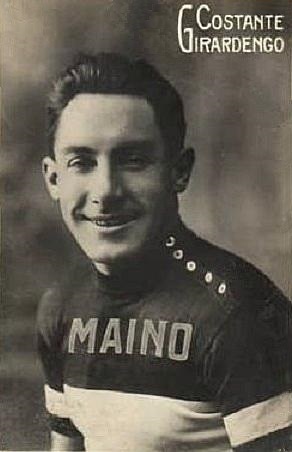
Costante Girardengo was an Italian professional road bicycle racer, considered by many to be one of the finest riders in the history of the sport. He was the first rider to be declared a "Campionissimo" or "champion of champions" by the Italian media and fans. At the height of his career, in the 1920s, he was said to be more popular than Mussolini and it was decreed that all express trains should stop in his home town Novi Ligure, an honour only normally awarded to heads of state.
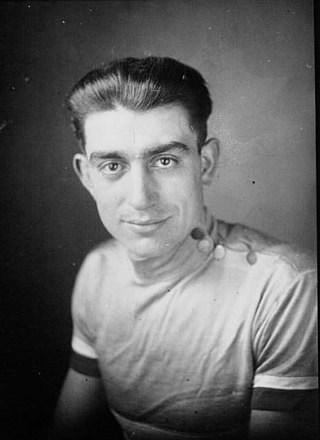
Antonin Magne was a French cyclist who won the Tour de France in 1931 and 1934. He raced as a professional from 1927 to 1939 and then became a team manager. The French rider and then journalist, Jean Bobet, described him in Sporting Cyclist as "a most uninterviewable character" and "a man who withdraws into a shell as soon as he meets a journalist." His taciturn character earned him the nickname of The Monk when he was racing.

Léon Scieur was a Belgian cyclist who won the 1921 Tour de France, along with stages 3 and 10. His first great victory was the 1920 Liège–Bastogne–Liège; he won a stage and finished fourth in the 1919 and 1920 Tours de France.

The 1927 Tour de France was the 21st edition of the Tour de France, taking place from 19 June to 17 July. It consisted of 24 stages over 5,398 km (3,354 mi).

The 1928 Tour de France was the 22nd edition of the Tour de France, taking place from 17 June to 15 July. It consisted of 22 stages over 5,376 km (3,340 mi).

Georges Ronsse was a two-time national cyclo-cross and two-time world champion road bicycle racer from Belgium, who raced between 1926 and 1938.

Jean Aerts was a Belgian road bicycle racer who specialized as a sprinter. Aerts became the first man to win both the world amateur (1927) and professional (1935) road race championships. In 1935, Aerts captured first place and the gold medal at the professional UCI Road World Championships in Floreffe, Belgium.
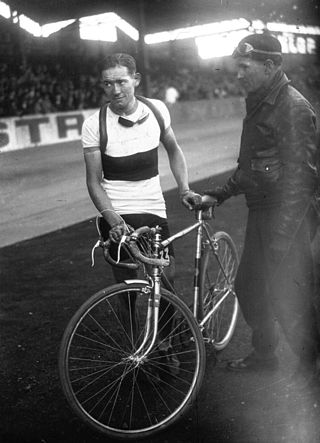
René Vietto was a French road racing cyclist.
Peugeot team was a French professional cycling team that promoted and rode Peugeot racing bikes.

Ferdinand Le Drogo was a French professional road bicycle racer. He is most known for his silver medal in the Elite race of the 1931 Road World Championships. Ferdinand Le Drogo was the older brother of cyclist Paul Le Drogo.

Système U was a French professional cycling team that existed from 1986 to 1988 and which cycled on and promoted Gitane racing bikes. In 1989 the team was renamed Super U–Raleigh–Fiat and rode Raleigh bicycles. Super U being a chain of supermarkets owned by the Système U group.

Francis Pélissier was a French professional road racing cyclist from Paris. He was the younger brother of Tour de France winner Henri Pélissier, and the older brother of Tour de France stage winner Charles Pélissier. He won several classic cycle races like Paris–Tours, Bordeaux–Paris and Grand Prix Wolber. He also won the French National Road Race Championship three times as well as two stages at the Tour de France.
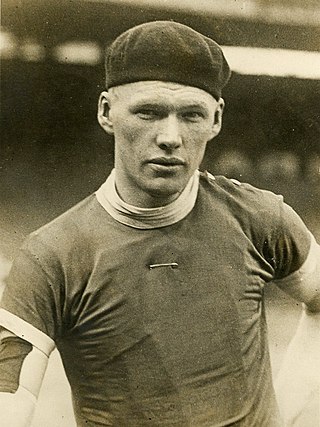
Alfred Haemerlinck was a Belgian professional road bicycle racer, who won many small races in his career. He won two stages in the 1931 Tour de France, and wore the yellow jersey for one day.
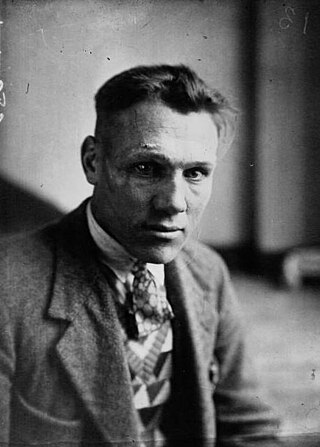
Julien Vervaecke was a Belgian professional road bicycle racer. He won Paris–Roubaix, Paris–Brussels, 2 stages in the Tour de France and finished 3rd in the 1927 Tour de France. At the start of the Second World War Battle of Belgium, when a British army detachment wanted to take his house, he refused, and was shot. His body was found weeks later, so the exact date of his death is not known.

Paul Chocque was a French professional road bicycle racer. He won a silver medal at the 1932 Summer Olympics in team pursuit event.

Louis Caput was a French professional racing cyclist and then team manager. He was born in Saint-Maur-des-Fosses, and won Paris–Tours in 1948, and two stages of the Tour de France. He was national champion in 1946.

Gerard Debaets was a Belgian racing cyclist. He won the Tour of Flanders in 1924 and 1927 and the Belgian national road race title in 1925. He also specialized in track cycling, winning a total of 18 six-day events, including six times the most prestigious Six Days of New York. Debaets was a resident of Fair Lawn and North Haledon, New Jersey, where he died in 1959 of a heart attack.
This page is based on this
Wikipedia article Text is available under the
CC BY-SA 4.0 license; additional terms may apply.
Images, videos and audio are available under their respective licenses.

















